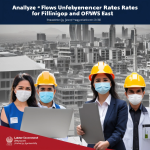Ultimate Guide to Choosing a Reputable OFW Recruitment Agency in the Philippines
Navigating the Labyrinth: Choosing Wisely in the OFW Recruitment Maze
The dream of a better life abroad lures millions of Filipinos to seek overseas employment each year. These Overseas Filipino Workers (OFWs), often hailed as modern-day heroes, contribute significantly to the Philippine economy through remittances, bolstering families and fueling national growth. However, the path to overseas employment is fraught with challenges, including the risk of falling prey to unscrupulous recruitment agencies. Choosing a reputable OFW recruitment agency is paramount to ensuring a safe and successful overseas employment experience.
This guide provides a comprehensive overview of how to navigate the OFW recruitment landscape in the Philippines, focusing on avoiding OFW scams, understanding recruitment fees, and protecting your OFW rights. The Philippine Overseas Employment Administration (POEA) estimates that a significant percentage of aspiring OFWs encounter some form of illegal recruitment, highlighting the urgent need for comprehensive education and awareness. Navigating the complexities of overseas employment requires a proactive approach. Aspiring OFWs must understand the legal framework governing overseas employment and the roles and responsibilities of various stakeholders, including the POEA and the Overseas Workers Welfare Administration (OWWA).
According to labor migration expert Dr. Patricia Santo Tomas, ‘Empowering OFWs with knowledge is the first line of defense against exploitation. Understanding their rights and the legal processes involved in overseas employment is crucial for a safe and fulfilling work experience.’ This involves verifying the legitimacy of the OFW recruitment agency through the POEA website, understanding the terms and conditions of the employment contract, and being aware of the permissible recruitment fees. The proliferation of OFW scams necessitates heightened vigilance.
Illegal recruitment often involves exorbitant fees, false promises of high-paying jobs, and the deployment of workers to unsafe or exploitative working conditions. Red flags include agencies that operate without a valid POEA license, demand upfront payments for processing fees, or fail to provide clear and transparent information about the job and the employer. It is crucial to remember that legitimate OFW recruitment agencies operate within a strict legal framework and are prohibited from engaging in such practices. Reporting suspected cases of illegal recruitment to the POEA is vital in protecting oneself and preventing others from becoming victims. By understanding the legal requirements for overseas employment and exercising due diligence in selecting an OFW recruitment agency, aspiring OFWs can significantly reduce their risk of exploitation and ensure a safer and more rewarding overseas work experience.
Decoding Legitimacy: Identifying Licensed and Accredited Agencies
The cornerstone of safe overseas employment lies in verifying the legitimacy of any OFW recruitment agency you consider. The Philippine Overseas Employment Administration (POEA) stands as the primary regulatory body, tasked with licensing and accrediting agencies authorized to recruit and deploy Overseas Filipino Workers (OFWs). Engaging with a POEA-licensed agency is non-negotiable; it’s your first line of defense against OFW scams and illegal recruitment. To confirm an agency’s status, meticulously check the POEA website (www.poea.gov.ph), utilizing the ‘List of Licensed Agencies’ search function.
This database provides crucial information, including the agency’s license number, validity period, and the specific job categories they are authorized to recruit for. Cross-referencing this information with other sources is a prudent step in your due diligence process. Beyond POEA accreditation, the Overseas Workers Welfare Administration (OWWA) plays a vital, complementary role in safeguarding worker welfare throughout the overseas employment journey. While POEA focuses on the recruitment process, OWWA provides support services to OFWs and their families, including welfare assistance, skills training, and reintegration programs upon their return.
Although OWWA doesn’t directly license recruitment agencies, accredited agencies are generally more inclined to prioritize ethical recruitment practices and provide comprehensive support to OFWs, recognizing that well-supported workers are more likely to succeed and contribute positively. Therefore, inquire about an agency’s relationship with OWWA and their commitment to worker welfare. Furthermore, delve deeper into an agency’s reputation and track record. Look for agencies with a history of ethical conduct, positive reviews from previous applicants, and a demonstrated commitment to upholding OFW rights.
Online forums, social media groups dedicated to OFWs, and word-of-mouth referrals can provide valuable insights into an agency’s practices. Consider whether the OFW recruitment agency is a member of reputable industry associations, as membership often signifies adherence to a code of ethics and a commitment to professional standards. Remember, choosing a legitimate and reputable agency is an investment in your future and a crucial step in protecting yourself from exploitation and the perils of illegal recruitment and unfair recruitment fees.
The Price of Opportunity: Understanding Recruitment Fees and Legal Limitations
Understanding recruitment fees is crucial to avoiding exploitation. Philippine law strictly regulates the fees that recruitment agencies can charge. As a general rule, agencies are prohibited from charging placement fees, except for certain categories of workers and specific destinations where such fees are permitted by law. Permissible fees typically include documentation costs (passport, medical exams, clearances), visa processing fees (if not shouldered by the employer), and transportation expenses to the job site. Always demand a detailed breakdown of all fees and insist on official receipts.
Be wary of agencies that demand exorbitant fees or pressure you to pay upfront before securing a job offer. The POEA provides guidelines on allowable fees, and it’s essential to familiarize yourself with these regulations. The prohibition of placement fees aims to protect Overseas Filipino Workers (OFWs) from predatory practices. However, understanding the nuances of permissible fees is equally important. For instance, while an OFW recruitment agency cannot directly charge a placement fee, they may facilitate the processing of necessary documents, the costs of which can be passed on to the applicant.
These costs must be reasonable and transparently documented. It is also vital to distinguish between legitimate fees and potential OFW scams, such as agencies inventing unnecessary charges or inflating the costs of mandatory requirements. Always cross-reference fee breakdowns with information available on the Philippine Overseas Employment Administration (POEA) website and consult with OWWA for clarification if needed. Navigating the landscape of recruitment fees also involves understanding your OFW rights. You have the right to a clear explanation of all fees, a receipt for every payment made, and the right to refuse to pay any fee that is not explicitly permitted by POEA regulations.
Furthermore, agencies are legally obligated to provide pre-departure orientation seminars (PDOS), and while there might be a minimal charge associated with PDOS, it should be within the prescribed limits. Any attempt to circumvent these regulations, such as demanding ‘training fees’ for skills you already possess, should be considered a red flag indicating potential illegal recruitment. Remember, knowledge of your rights is your best defense against exploitation in the pursuit of overseas employment. Finally, be vigilant against agencies that promise exceptionally low fees or claim to have exclusive deals that bypass standard procedures.
These are often tactics used to lure desperate job seekers into OFW scams. Always verify the agency’s POEA license and accreditation status before engaging in any financial transactions. If an agency claims that a foreign employer will reimburse your recruitment fees, insist on seeing proof of this agreement in writing. Furthermore, understand that while some employers may indeed cover certain costs, this should not be a substitute for transparency and adherence to Philippine law regarding allowable recruitment fees. Report any suspected cases of overcharging or illegal fee practices to the POEA immediately to protect yourself and other aspiring Overseas Filipino Workers.
Red Flags and False Promises: Recognizing and Avoiding Common Recruitment Scams
The desperation to secure overseas employment makes Overseas Filipino Workers (OFWs) particularly vulnerable to recruitment scams, a pervasive problem that demands constant vigilance. These OFW scams often begin with enticing promises that are simply too good to be true, exploiting the dreams of a better life. A common red flag is an OFW recruitment agency guaranteeing immediate placement, a practice almost always indicative of fraudulent activity. Legitimate agencies, adhering to Philippine Overseas Employment Administration (POEA) regulations, understand that the recruitment process involves several stages, including employer interviews and documentation, making instant job offers highly improbable.
Always approach such claims with extreme caution and cross-reference the agency’s claims with information available on the POEA website. Another prevalent tactic involves demanding excessive recruitment fees upfront, often disguised as processing fees or training costs. While some fees are permissible under specific circumstances, Philippine law strictly regulates what an OFW recruitment agency can charge. It is crucial to understand your OFW rights and the legal limitations on recruitment fees. Agencies that pressure applicants for large sums of money before securing a formal job offer should be viewed with suspicion.
Always request a detailed breakdown of all fees and compare them against the POEA’s guidelines. Remember that legitimate agencies typically only collect permissible fees after a job offer has been accepted and a contract signed. Be especially wary of agencies operating solely online or through social media platforms without a verifiable physical address and proper POEA accreditation. Illegal recruitment often thrives in the anonymity of the internet. Before engaging with any OFW recruitment agency, meticulously verify its license and accreditation status on the POEA website.
Look for the agency’s physical address and contact information, and attempt to visit their office to assess their legitimacy. Never provide personal documents, such as your passport or bank details, or financial information to unverified sources. Report any suspicious activity to the POEA immediately to protect yourself and other aspiring Overseas Filipino Workers from falling victim to illegal recruitment. Furthermore, familiarize yourself with the services offered by OWWA to support OFWs and their families, ensuring you have access to resources should you encounter difficulties during your overseas employment journey.
Know Your Worth: Protecting Your Rights as an OFW Applicant
As an OFW applicant, understanding and asserting your OFW rights is paramount. Reputable OFW recruitment agency practices are built upon a foundation of transparency and respect for these rights, as mandated by the Philippine Overseas Employment Administration (POEA). This includes the right to a fair and transparent recruitment process, ensuring you are fully informed about the job, employer, and terms of employment. It also guarantees a clear and understandable employment contract, written in a language you comprehend, detailing salary, benefits, working hours, and termination clauses.
Any ambiguity should be addressed before signing. Remember, a legitimate OFW recruitment agency will encourage you to seek clarification and legal advice. Your protection extends to safe and decent working conditions overseas, a cornerstone of OFW rights. The POEA requires accredited agencies to ensure that deployed Overseas Filipino Workers (OFWs) are placed in environments that meet international labor standards. Before deployment, inquire about the mechanisms in place for addressing grievances or instances of abuse. Furthermore, you possess the right to legal protection and assistance throughout your overseas employment journey.
This includes access to the Overseas Workers Welfare Administration (OWWA) for welfare services, legal aid, and repatriation assistance if needed. Knowing these resources can be crucial in navigating potential challenges. Beware of OFW scams that often exploit a lack of awareness regarding OFW rights. Illegal recruitment frequently involves agencies making false promises or demanding exorbitant recruitment fees, practices strictly prohibited by Philippine law. Before committing to any agreement, verify the agency’s POEA license and accreditation. Familiarize yourself with permissible recruitment fees to avoid exploitation. If you encounter any suspicious activity or believe your rights have been violated, report it immediately to the POEA. Protecting yourself against illegal recruitment is not just a personal responsibility; it’s a crucial step in safeguarding the integrity of the overseas employment process for all Overseas Filipino Workers.
Due Diligence: Key Questions to Ask Agencies Before Signing Contracts
Before signing any contracts or paying any fees, engaging in thorough due diligence is paramount. Ask the OFW recruitment agency key questions to assess their legitimacy, ethical standards, and commitment to Overseas Filipino Workers’ welfare. Begin with the basics: ‘What is your POEA license number and validity period?’ and ‘Can I see a copy of your accreditation certificate?’ These are non-negotiable. A legitimate agency will readily provide this information, verifiable on the Philippine Overseas Employment Administration (POEA) website.
Refusal or hesitation should be an immediate red flag, suggesting potential involvement in OFW scams or illegal recruitment activities. Delve deeper into the financial aspects. Inquire, ‘What are the specific recruitment fees I am required to pay, and can I have a detailed breakdown?’ Understanding permissible recruitment fees, as governed by POEA regulations, is crucial. Be wary of exorbitant or vaguely defined charges. Remember, excessive fees are a hallmark of exploitation. Scrutinize the ‘terms and conditions of the employment contract’ meticulously.
Ensure clarity on salary, working hours, benefits, and grounds for termination. Request clarification on any ambiguous clauses. The agency should facilitate a comprehensive understanding of your OFW rights and obligations under Philippine and host country laws. Finally, assess the agency’s commitment to your well-being beyond deployment. Ask, ‘What support services do you provide to OFWs after deployment?’ and ‘What is your process for handling complaints and resolving disputes?’ A responsible agency offers ongoing assistance, including access to OWWA programs, legal aid, and repatriation support if needed. Request references: ‘Can I speak to previous applicants who have been deployed through your agency?’ Direct testimonials offer invaluable insights into the agency’s actual practices. The answers to these questions will provide valuable insights into the agency’s operations and help you make an informed decision, protecting you from potential exploitation and ensuring a safer overseas employment journey.
Speaking Up: Resources for Reporting Illegal Recruitment Activities
If you encounter illegal recruitment activities, reporting them immediately is crucial to protect yourself and others. The Philippine Overseas Employment Administration (POEA) is the primary government body tasked with combating illegal recruitment. You can file a formal complaint through the POEA website, providing detailed information about the suspected illegal activity, or visit their office in person. Be prepared to furnish specifics such as the OFW recruitment agency’s name, address, contact details, the names of individuals involved, copies of documents like receipts or contracts, and a clear account of the events that transpired.
Remember, the more detailed your report, the better equipped the POEA will be to investigate and take appropriate action. Reporting suspected OFW scams is not just a civic duty; it’s an act of solidarity with fellow Overseas Filipino Workers (OFWs). Beyond the POEA, consider reporting the incident to other relevant authorities. The National Bureau of Investigation (NBI) has a dedicated division for handling cases of fraud and illegal recruitment. Local police stations can also assist, particularly if you feel threatened or have been physically harmed.
Additionally, the Overseas Workers Welfare Administration (OWWA) provides support and legal assistance to OFWs and their families who have been victims of illegal recruitment. Don’t hesitate to seek help from these organizations; they are there to protect your OFW rights and ensure that justice is served. Remember that reputable agencies will never discourage you from seeking legal counsel or reporting suspicious behavior. Taking action against illegal recruitment helps dismantle the networks that exploit vulnerable job seekers.
By reporting these activities, you contribute to a safer and more ethical overseas employment landscape. Your vigilance can prevent others from falling prey to unscrupulous individuals or fake agencies promising unrealistic opportunities and demanding exorbitant recruitment fees. It also sends a clear message to those engaged in illegal recruitment that their actions will not be tolerated. By working together and reporting suspicious activity, we can collectively protect aspiring OFWs from exploitation and ensure that overseas employment remains a pathway to a better future, not a source of despair. Remember, protecting OFW rights is everyone’s responsibility.


